China’s top legislative body empowers city authorities to unseat legislators without need to go through courts
After four opposition members removed, their 15 remaining colleagues say they will quit in protest on Thursday
Tony Cheung and Jeffie Lam
Published: 11:16pm, 11 Nov, 2020
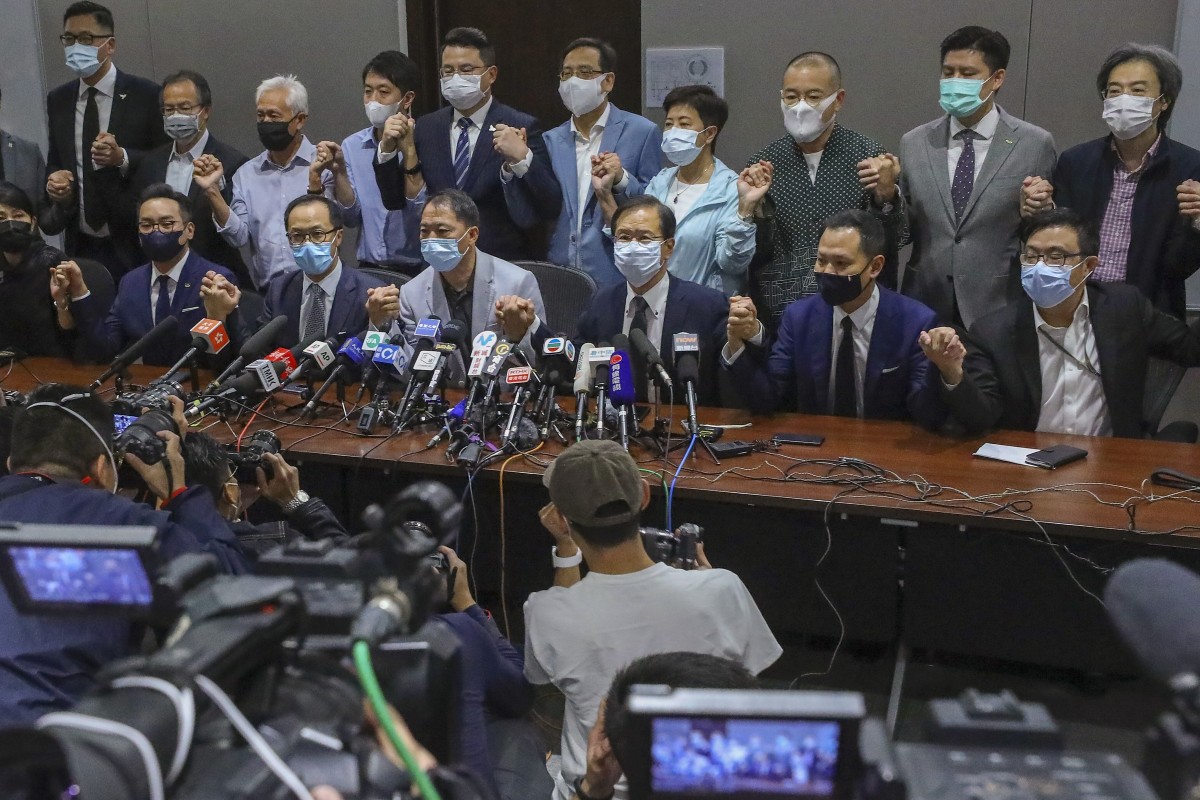
Pan-democratic lawmakers put on a show of unity on Wednesday following the ejection of four lawmakers. Photo: Dickson Lee
Hong Kong’s opposition lawmakers will all resign together to protest against the disqualification of four colleagues after China’s top legislative body empowered the local government to unseat politicians without having to go through the city’s courts.
Under a resolution unanimously endorsed on Wednesday by 161 members of the National People’s Congress Standing Committee (NPCSC), Hong Kong lawmakers will lose their Legislative Council seats immediately if they are deemed to have engaged in a range of acts, from endangering national security to dishonouring their pledge of allegiance and refusing to support China’s sovereignty over the city.
The local government quickly followed up the ruling by disqualifying the Civic Party’s Alvin Yeung Ngok-kiu, Kwok Ka-ki and Dennis Kwok, along with Kenneth Leung of the Professionals Guild, all four of whom were previously barred from running in September’s Legco elections which were postponed for a year.
Hong Kong’s leader, Chief Executive Carrie Lam Cheng Yuet-ngor, said she had asked Beijing to step in because the four posed a constitutional anomaly in being allowed to carry on serving as lawmakers when they had already been disqualified from running for re-election over their calls for foreign governments to sanction the Hong Kong and central governments.
“[Beijing’s ruling] has made it very clear that the criteria for anyone who has taken an oath and served as a legislative councillor but thereafter they have engaged in activities which are breaching those requirements, is that they should immediately lose their qualification,” she said.
Hong Kong is a society under the rule of law ... It’s not only the executive branch which has a sayCarrie Lam, Hong Kong chief executive
Lam said the NPCSC’s decision did not mean she now had additional powers to unseat legislators.
Officials such as electoral officers, the justice minister, the Legco president and the courts would still need to follow existing constitutional and election laws, she said.
“Hong Kong is a society under the rule of law ... It’s not only the executive branch which has a say,” Lam said.
She insisted the NPCSC’s decision had little to do with the pan-democrats’ delaying tactics in the legislature, even though their filibustering had been cited by pro-establishment rivals earlier as justification to have them disqualified.
With no more opposition lawmakers left in the city’s legislature, Lam’s planned legislative amendments could have far-reaching implications for the city’s political and electoral systems, commentators said.
Making good on a threat they had issued on Monday, Democratic Party chairman Wu Chi-wai said all 15 remaining pan-democratic lawmakers would tender their resignations on Thursday.
“All the power will be centralised with the chief executive – a puppet of the central government. So today is the end of ‘one country, two systems’,” he said, referring to the governing policy under which Hong Kong is allowed a high degree of autonomy.
But pro-establishment lawmakers said the pan-democrats had only themselves to blame, and Beijing’s decision would ensure Hong Kong’s prosperity and stability.
They said the remaining 41 members from their camp would “act more diligently” to monitor the government, dismissing critics’ warnings that Legco would be reduced to a compliant “rubber stamp”.
“If the council turns quiet [without the opposition], the remaining lawmakers will be able to scrutinise government proposals in a more critical and careful manner,” said the camp’s leader, Martin Liao Cheung-kong.
What might lie ahead if Beijing moves to disqualify Hong Kong lawmakers
11 Nov 2020

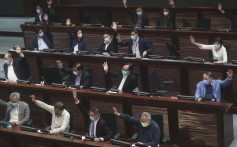
Independent lawmakers Cheng Chung-tai and Pierre Chan will also remain in Legco.
The NPCSC resolution stipulated that lawmakers would lose their seats if they were deemed to have promoted or supported the notion of Hong Kong independence and sought foreign intervention in the city’s affairs.
Lawmakers could also be disqualified if they “were recognised in accordance with the law” to have failed to meet the legal requirement of “upholding the Basic Law and pledging allegiance to Hong Kong as a special administrative region of China” – as stated in their oath of office.
“This decision applies to lawmakers whose candidacies were invalidated during the nomination period of the Legco election originally slated for September 6,” the resolution stated, in a reference to the four disqualified pan-democrats.
NPCSC chairman Li Zhanshu, China’s third-ranking state leader, issued a statement saying the decision was “necessary and appropriate”.
“This is another important piece of legislation, as the standing committee insists on the ‘one country, two systems’ principle and improves its systems to protect national security,” he said.
In separate statements, the State Council’s Hong Kong and Macau Affairs Office (HKMAO) and Beijing’s liaison office in Hong Kong expressed firm support.
Beijing vows to ‘prevent and curb’ external meddling in Hong Kong affairs
4 Nov 2020

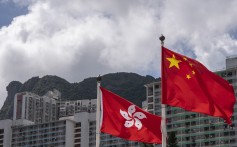
Quoting late paramount leader Deng Xiaoping, the HKMAO said: “Deng had pointed out that [the principle of] ‘Hong Kong people governing Hong Kong’ has its bottom line and standard, which is that patriots must form the main body of the city’s administrators.”
The liaison office also condemned the pan-democrats’ plan to quit as “irresponsible”.
The NPCSC interpreted Article 104 of the Basic Law back in 2016 to rule that lawmakers and other public officers must take their oath “solemnly and sincerely”. That ruling resulted in the disqualification of six opposition lawmakers.
Lam said on Wednesday that her government would amend local laws next to ensure they aligned with both the 2016 interpretation and the latest ruling from Beijing.
“It could involve specifying the formalities of oath-taking, who oversees it, as well as the mechanism and consequences of a breach of the oath,” she said.
In July, Lam suggested that there was no “legal basis” to stop the four lawmakers from serving out their extended term, even after they were banned from running for re-election, as she sought Beijing’s approval for the Legco polls to be postponed by a year, citing public health concerns because of the coronavirus pandemic.
While the NPCSC endorsed the postponement of the election in August, it did not make a specific ruling on the fate of the four back then.
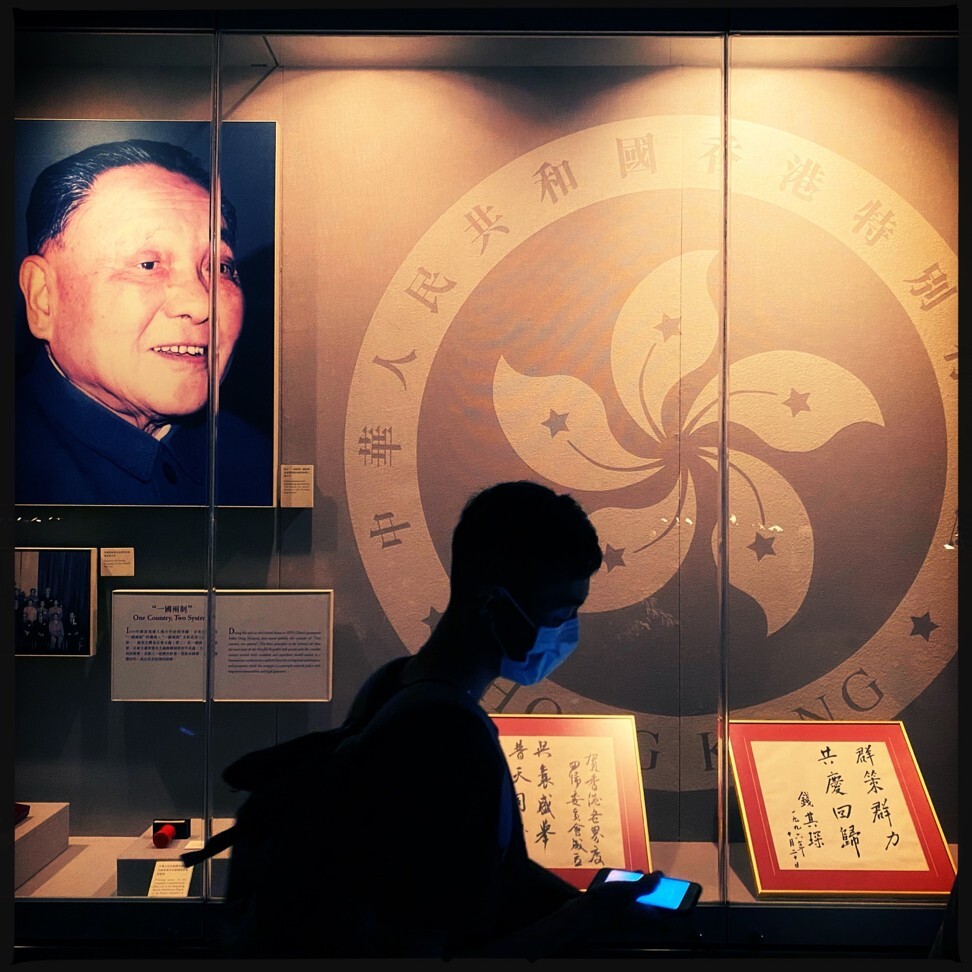
A portrait of Deng Xiaoping hangs beside the emblem of Hong Kong at an exhibit at the Hong Kong Museum of History. Photo: Robert Ng
However, since the extended Legco term started a month ago, pro-Beijing lawmakers have repeatedly called for action to be taken against the pan-democrats for filibustering with repeated quorum calls at council meetings.
Before Tam Yiu-chung, Hong Kong’s sole delegate to the NPCSC, travelled to Beijing on Monday, he also described filibustering as grounds for disqualification.
But as the resolution stopped short of mentioning delaying tactics, Lam argued that it was not aimed at stopping filibustering.
“We would not take away members’ qualifications because they deploy certain parliamentary tactics,” she said. “We would not like to see this ... but that is not the purpose of this decision at all.”
Maria Tam Wai-chu, vice-chairwoman of the Basic Law Committee, which advises Beijing on Hong Kong’s mini-constitution, said the NPCSC’s decision could not be challenged in the city’s courts.
Tam Yiu-chung said the decision should serve as a reminder to lawmakers about being mindful of their conduct in the legislature.
Professor Johannes Chan Man-mun, a legal expert at the University of Hong Kong, criticised the resolution for bypassing the courts, saying it was unfair for the NPCSC to leave no room for lawmakers to explain or review their disqualifications.
Britain was quick to condemn Beijing’s move as “a further assault on Hong Kong’s high degree of autonomy”.
Foreign Secretary Dominic Raab said: “This campaign to harass, stifle and disqualify democratic opposition tarnishes China’s international reputation and undermines Hong Kong’s long-term stability.”
This article appeared in the South China Morning Post print edition as: New rule ousts lawmakers New rule sees four opposition members ousted
CONVERSATIONS (5)
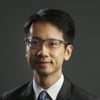
Tony Cheung
Ton Cheung became a political journalist in 2007. He joined the Post in 2012 and now leads the Hong Kong-mainland relations team on the Hong Kong desk. Tony also writes about the economy, and reports from mainland China, the United States, Germany and Britain.

Jeffie Lam
Jeffie writes predominantly about Hong Kong politics, but is also interested in social welfare issues, such as the city's ageing population and elderly care. She joined the Post in 2013 after beginning her career as a political reporter in 2009. In 2016, she won the English features merit prize in the 20th Human Rights Press Awards.
Tony Cheung and Jeffie Lam
Published: 11:16pm, 11 Nov, 2020

Pan-democratic lawmakers put on a show of unity on Wednesday following the ejection of four lawmakers. Photo: Dickson Lee
Hong Kong’s opposition lawmakers will all resign together to protest against the disqualification of four colleagues after China’s top legislative body empowered the local government to unseat politicians without having to go through the city’s courts.
Under a resolution unanimously endorsed on Wednesday by 161 members of the National People’s Congress Standing Committee (NPCSC), Hong Kong lawmakers will lose their Legislative Council seats immediately if they are deemed to have engaged in a range of acts, from endangering national security to dishonouring their pledge of allegiance and refusing to support China’s sovereignty over the city.
The local government quickly followed up the ruling by disqualifying the Civic Party’s Alvin Yeung Ngok-kiu, Kwok Ka-ki and Dennis Kwok, along with Kenneth Leung of the Professionals Guild, all four of whom were previously barred from running in September’s Legco elections which were postponed for a year.
Hong Kong’s leader, Chief Executive Carrie Lam Cheng Yuet-ngor, said she had asked Beijing to step in because the four posed a constitutional anomaly in being allowed to carry on serving as lawmakers when they had already been disqualified from running for re-election over their calls for foreign governments to sanction the Hong Kong and central governments.
“[Beijing’s ruling] has made it very clear that the criteria for anyone who has taken an oath and served as a legislative councillor but thereafter they have engaged in activities which are breaching those requirements, is that they should immediately lose their qualification,” she said.
Hong Kong is a society under the rule of law ... It’s not only the executive branch which has a sayCarrie Lam, Hong Kong chief executive
Lam said the NPCSC’s decision did not mean she now had additional powers to unseat legislators.
Officials such as electoral officers, the justice minister, the Legco president and the courts would still need to follow existing constitutional and election laws, she said.
“Hong Kong is a society under the rule of law ... It’s not only the executive branch which has a say,” Lam said.
She insisted the NPCSC’s decision had little to do with the pan-democrats’ delaying tactics in the legislature, even though their filibustering had been cited by pro-establishment rivals earlier as justification to have them disqualified.
With no more opposition lawmakers left in the city’s legislature, Lam’s planned legislative amendments could have far-reaching implications for the city’s political and electoral systems, commentators said.
Making good on a threat they had issued on Monday, Democratic Party chairman Wu Chi-wai said all 15 remaining pan-democratic lawmakers would tender their resignations on Thursday.
“All the power will be centralised with the chief executive – a puppet of the central government. So today is the end of ‘one country, two systems’,” he said, referring to the governing policy under which Hong Kong is allowed a high degree of autonomy.
But pro-establishment lawmakers said the pan-democrats had only themselves to blame, and Beijing’s decision would ensure Hong Kong’s prosperity and stability.
They said the remaining 41 members from their camp would “act more diligently” to monitor the government, dismissing critics’ warnings that Legco would be reduced to a compliant “rubber stamp”.
“If the council turns quiet [without the opposition], the remaining lawmakers will be able to scrutinise government proposals in a more critical and careful manner,” said the camp’s leader, Martin Liao Cheung-kong.
What might lie ahead if Beijing moves to disqualify Hong Kong lawmakers
11 Nov 2020

Independent lawmakers Cheng Chung-tai and Pierre Chan will also remain in Legco.
The NPCSC resolution stipulated that lawmakers would lose their seats if they were deemed to have promoted or supported the notion of Hong Kong independence and sought foreign intervention in the city’s affairs.
Lawmakers could also be disqualified if they “were recognised in accordance with the law” to have failed to meet the legal requirement of “upholding the Basic Law and pledging allegiance to Hong Kong as a special administrative region of China” – as stated in their oath of office.
“This decision applies to lawmakers whose candidacies were invalidated during the nomination period of the Legco election originally slated for September 6,” the resolution stated, in a reference to the four disqualified pan-democrats.
NPCSC chairman Li Zhanshu, China’s third-ranking state leader, issued a statement saying the decision was “necessary and appropriate”.
“This is another important piece of legislation, as the standing committee insists on the ‘one country, two systems’ principle and improves its systems to protect national security,” he said.
In separate statements, the State Council’s Hong Kong and Macau Affairs Office (HKMAO) and Beijing’s liaison office in Hong Kong expressed firm support.
Beijing vows to ‘prevent and curb’ external meddling in Hong Kong affairs
4 Nov 2020

Quoting late paramount leader Deng Xiaoping, the HKMAO said: “Deng had pointed out that [the principle of] ‘Hong Kong people governing Hong Kong’ has its bottom line and standard, which is that patriots must form the main body of the city’s administrators.”
The liaison office also condemned the pan-democrats’ plan to quit as “irresponsible”.
The NPCSC interpreted Article 104 of the Basic Law back in 2016 to rule that lawmakers and other public officers must take their oath “solemnly and sincerely”. That ruling resulted in the disqualification of six opposition lawmakers.
Lam said on Wednesday that her government would amend local laws next to ensure they aligned with both the 2016 interpretation and the latest ruling from Beijing.
“It could involve specifying the formalities of oath-taking, who oversees it, as well as the mechanism and consequences of a breach of the oath,” she said.
In July, Lam suggested that there was no “legal basis” to stop the four lawmakers from serving out their extended term, even after they were banned from running for re-election, as she sought Beijing’s approval for the Legco polls to be postponed by a year, citing public health concerns because of the coronavirus pandemic.
While the NPCSC endorsed the postponement of the election in August, it did not make a specific ruling on the fate of the four back then.

A portrait of Deng Xiaoping hangs beside the emblem of Hong Kong at an exhibit at the Hong Kong Museum of History. Photo: Robert Ng
However, since the extended Legco term started a month ago, pro-Beijing lawmakers have repeatedly called for action to be taken against the pan-democrats for filibustering with repeated quorum calls at council meetings.
Before Tam Yiu-chung, Hong Kong’s sole delegate to the NPCSC, travelled to Beijing on Monday, he also described filibustering as grounds for disqualification.
But as the resolution stopped short of mentioning delaying tactics, Lam argued that it was not aimed at stopping filibustering.
“We would not take away members’ qualifications because they deploy certain parliamentary tactics,” she said. “We would not like to see this ... but that is not the purpose of this decision at all.”
Maria Tam Wai-chu, vice-chairwoman of the Basic Law Committee, which advises Beijing on Hong Kong’s mini-constitution, said the NPCSC’s decision could not be challenged in the city’s courts.
Tam Yiu-chung said the decision should serve as a reminder to lawmakers about being mindful of their conduct in the legislature.
Professor Johannes Chan Man-mun, a legal expert at the University of Hong Kong, criticised the resolution for bypassing the courts, saying it was unfair for the NPCSC to leave no room for lawmakers to explain or review their disqualifications.
Britain was quick to condemn Beijing’s move as “a further assault on Hong Kong’s high degree of autonomy”.
Foreign Secretary Dominic Raab said: “This campaign to harass, stifle and disqualify democratic opposition tarnishes China’s international reputation and undermines Hong Kong’s long-term stability.”
This article appeared in the South China Morning Post print edition as: New rule ousts lawmakers New rule sees four opposition members ousted
CONVERSATIONS (5)

Tony Cheung
Ton Cheung became a political journalist in 2007. He joined the Post in 2012 and now leads the Hong Kong-mainland relations team on the Hong Kong desk. Tony also writes about the economy, and reports from mainland China, the United States, Germany and Britain.

Jeffie Lam
Jeffie writes predominantly about Hong Kong politics, but is also interested in social welfare issues, such as the city's ageing population and elderly care. She joined the Post in 2013 after beginning her career as a political reporter in 2009. In 2016, she won the English features merit prize in the 20th Human Rights Press Awards.
No comments:
Post a Comment